American Gun Ownership: The Positive Impacts of Law-Abiding Citizens Owning Firearms
You're free to republish or share any of our articles (either in part or in full), which are licensed under a Creative Commons Attribution 4.0 International License. Our only requirement is that you give Ammo.com appropriate credit by linking to the original article. Spread the word; knowledge is power!
When the British marched on the Colonies' weapon holds in Lexington and Concord, the Colonists knew it was their last chance to retain any semblance of freedom. Today, American gun ownership reflects a similar philosophy.
An armed civilian populace will always be a deterrent to tyranny. With millions of gun owners in America, the Constitutional rights of all cannot be infringed. Unfortunately, many Americans would sacrifice those rights for a little temporary safety, and it’s time to start truly understanding the rights our founders secured for us.
In 2024, approximately 112 million Americans own guns.
Support for gun control has dropped from 78% in 1990 to 54%.
72% of U.S. gun owners cite personal protection as their primary reason for owning a gun.
Between 60,000 and 3,000,000 Americans use guns to deter threats annually.
The Second Amendment is a limitation of the government, not a permission provided by it.
Ammunition and firearms are integral to American culture.
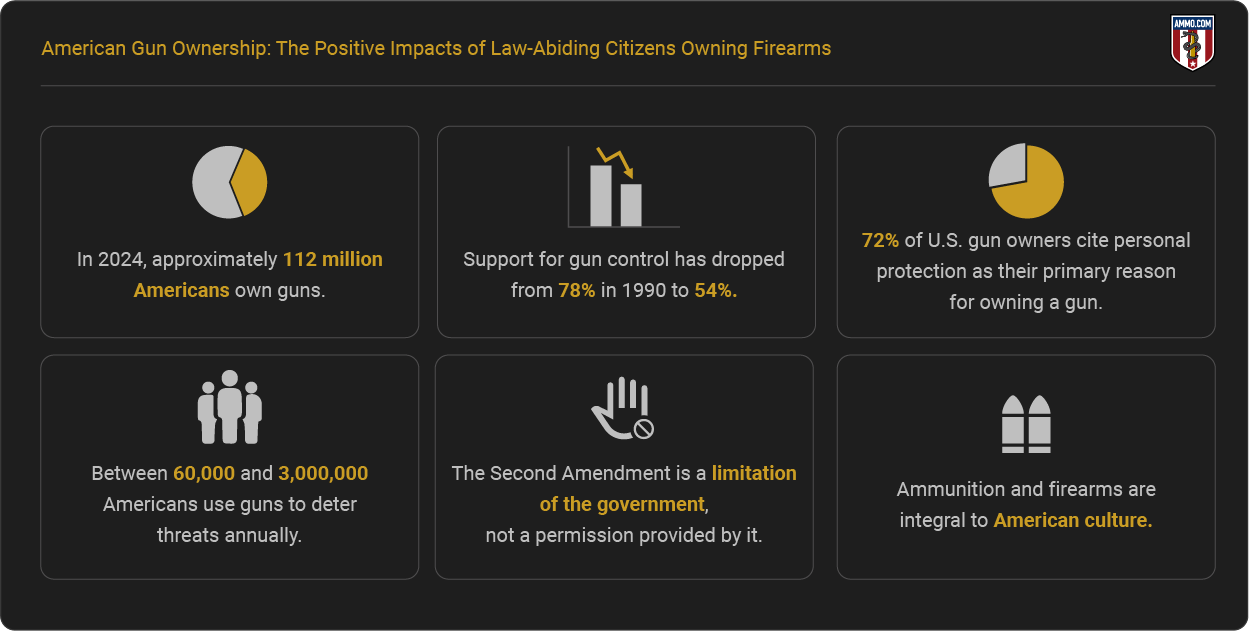
Ammo.com strives to provide evidence-based information rooted in facts. You can review our sources here.
American Gun Ownership: A Way of Life
The United States has millions of guns and millions of gun owners. Examining gun ownership, the reasons for it, and the effects of it is critical to understanding it.
Gun ownership is as American as apple pie and football. There are many reasons Americans own guns, whether it’s brevity, stubbornness, or a can-do attitude. Nearly half of the country has at least one firearm in their homes. Even James Madison stated that gun ownership gives us advantages over other countries, and Ben Franklin warned us never to give them up.
Of course, just like apple pie and football, the topic of gun ownership is hotly debated. Is our way of life the wrong way? The data says no.
Armed civilians are more likely to defend themselves and their communities with firearms than the police. On average, 1,608 armed civilians kill a violent attacker with a firearm, while 1,188 suspects are killed by police annually. 3, 4, 5, 6
A 1992 study showed that more criminals are injured by gunfire from armed civilians than the police. 1
Despite calls for more gun control, support for more legislative restrictions has fallen drastically in the past thirty years from 78% to 56%. Support for relaxing gun control is now up from 2% to 11%. 7
Approximately 112 million (one-third of 336 million citizens) own at least one firearm, and 81% believe it makes them safer. 9
7 Reasons to Own a Gun in America
There are an estimated 500 million firearms and 279 million adults in America today, resulting in approximately 1.98 firearms per adult. On average, each gun owner possesses at least two guns. Additionally, about half of the nation's population has access to at least one firearm in their home.
People around the world have various reasons for owning a gun. In the United States, this topic is particularly contentious.
While American gun owners do not need to justify exercising their rights, several arguments support firearm ownership that benefit both individuals and society. These include personal protection, recreational activities like hunting and sport shooting, and the deterrence of crime. Additionally, many believe that gun ownership is a fundamental right that ensures personal freedom and security.
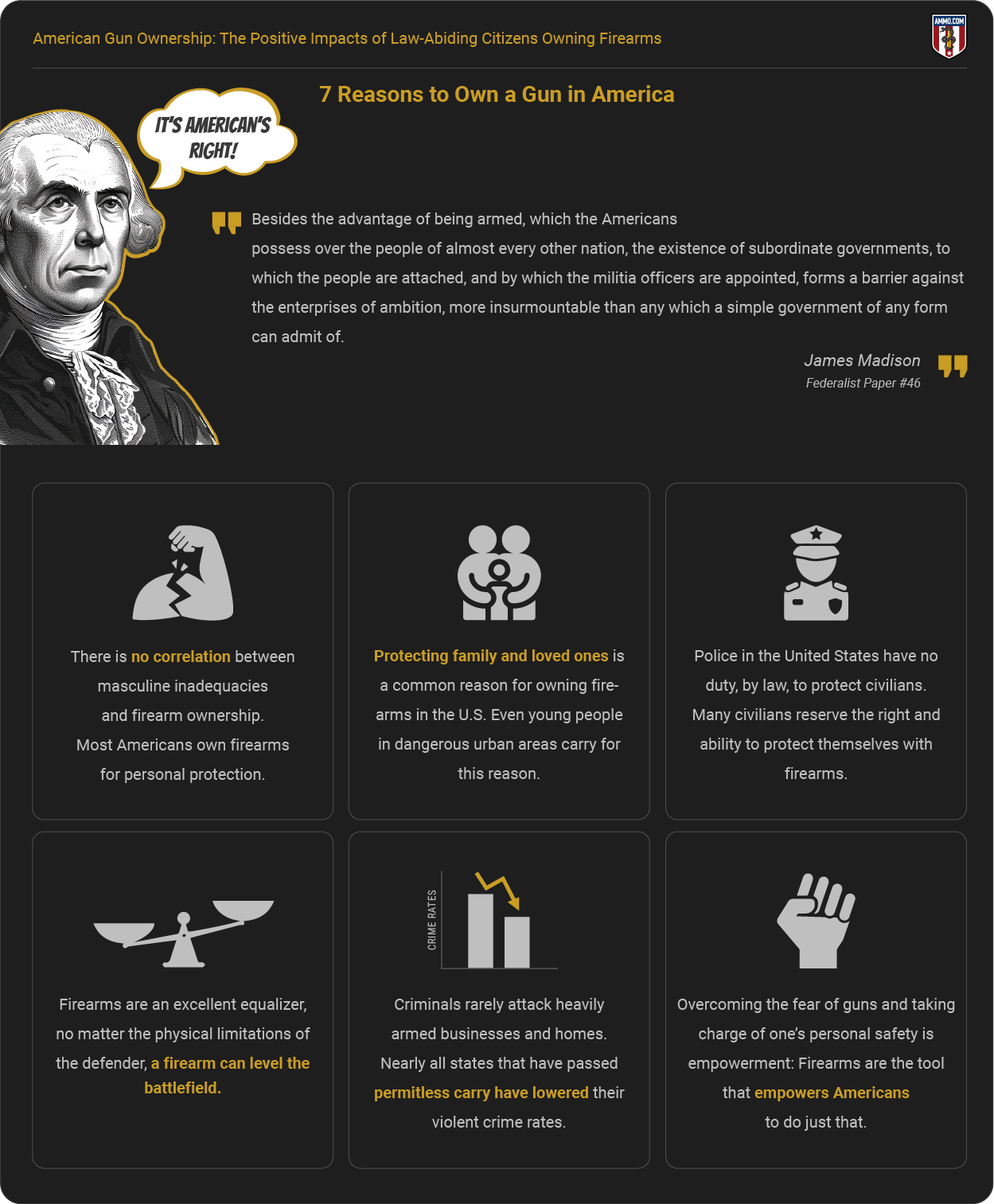
Gun Owners Value the Right to Keep and Bear Arms
The father of the Constitution, James Madison, made clear that Americans not only had an inalienable right to keep and bear arms but that this right gave us an advantage over every other nation in the world.
Many gun owners fully understand the right and duty to protect themselves, their home, their family, and their country. Therefore, gun ownership is a necessary duty to society as a right not exercised is a right lost.
Feelings of Confidence, Safety, and Security
72% of American gun owners cite personal protection as a reason for owning firearms.9 38% of Americans report keeping a gun loaded and ready to fire in the event of an emergency or life-threatening situation.10
While the vast majority (60%) of Americans think that gun violence is a problem, most gun owners believe that having a gun increases their personal safety, security, and well-being.9 Incidentally, even 75% of inner-city youth own firearms for personal safety.11
Many Americans also keep and bear arms for reasons other than personal safety and security. Hunting, collecting, shooting sports, and profession are all alternative reasons to own a gun.
On the other hand, recent studies also show that gun owners are not compensating for personal inadequacies despite the theories of anti-gun activists. Many non-gun owners believe that male gun owners are attracted to firearms as phallic symbols or that they’re representative of masculine strength, which the gun owner is otherwise lacking.
On the contrary, there is no correlation between feelings of sexual inadequacy and firearm ownership12. Those who are more confident in their size own guns at higher rates than those who are self-conscious13, and women are the fastest-growing demographic of gun owners in the U.S.8
Ultimately, the facts support gun ownership as a means to protect oneself and others from harm.
Protection of Family and Loved Ones
Protection of family and loved ones is a common reason for owning and carrying a firearm. In a 2020 study, 72% of youth respondents who carry a gun cite their family’s safety as a reason for carrying. 1181% of American gun owners believe that having a gun in the home makes the home safer, even in homes where children reside.9
As crime rates increase and police become handicapped by red tape, underfunding, and failed crime policy, those who want to ensure their family’s safety are picking up firearms at much higher rates than before 2020.
Personal Protection
In the 2005 Supreme Court ruling Castle Rock vs. Gonzalez, the Supreme Court ruled that police officers have no duty to protect citizens. 14In 2022, there were 380 violent crimes for every 100,000 people 16 and 7.5 homicides for every 100,000 people.4
Despite having lower crime rates and homicide rates than many other countries, Americans tend to take personal protection more seriously than most other cultures around the globe.
The Most Efficient Tool for Personal Defense
It’s an indisputable fact for most logical people that firearms are an excellent equalizer. Physical limitations are largely inconsequential when a defender is proficient with a firearm, and many Americans seem to agree.
As crime rates skyrocketed during the pandemic, so too did traceable firearm sales. It is estimated that Americans purchased more than 60 million firearms between 2020 and 2022. 18
As violent individuals continue to threaten and harm unsuspecting and defenseless civilians, more people look to empower themselves. Firearms are an excellent equalizer. A person’s size, ability, weight, height, and strength are inconsequential to a fight if the intended victim is armed.
The Most Efficient Tool for Personal Defense
Criminologists have long theorized that criminals take advantage of opportunities. Unsuspecting and defenseless victims are often easy prey for some of the most violent people in our communities.
The United States does not track every incident where a criminal is deterred from committing a crime thanks to an armed citizen. However, we can look to gun-free zones, permitless carry, and crime for insight into armed citizens as a deterrent.
More armed citizens in states with permitless carry have reduced violent crime rates. In fact, 84% of states have lower violent crime rates after passing permitless carry legislation.
Guns Are Tools of Empowerment
Just over a decade ago, only 13% of women owned firearms. 9 In 2023, that number increased to 25% 8, or thirty-three million females empowered to keep and bear arms.
Unfortunately, crime in America is up while policing and incarceration rates are down. Guns are tools of empowerment, helping joggers feel more secure on their routes or homeowners feel more secure in their residences.
Some theories exist that state having a gun makes people more anxious. However, one recent study cites “hypervigilance” as anxiety. The study fails to address Col. Cooper’s Color Code of Awareness, where many gun owners live in the yellow, and that people who are empowered to carry a firearm are also often more aware of their surroundings than others in the first place (hence why they’re carrying a gun).
Essentially, while some say that gun ownership increases anxiety, it is a tool of empowerment embraced by those willing to take on the responsibility of owning and possessing a firearm.
How Gun Ownership Affects the Safety of the Public
Many 2A proponents state that an armed populace does nothing to deter crime. However, those same proponents also say that civilians having more guns would turn America into the Wild West.
We’re about to discuss why neither of those things is true. In fact, we’ll show you that Americans are safer than many other countries, thanks to our rich gun culture and do-it-yourself attitude.
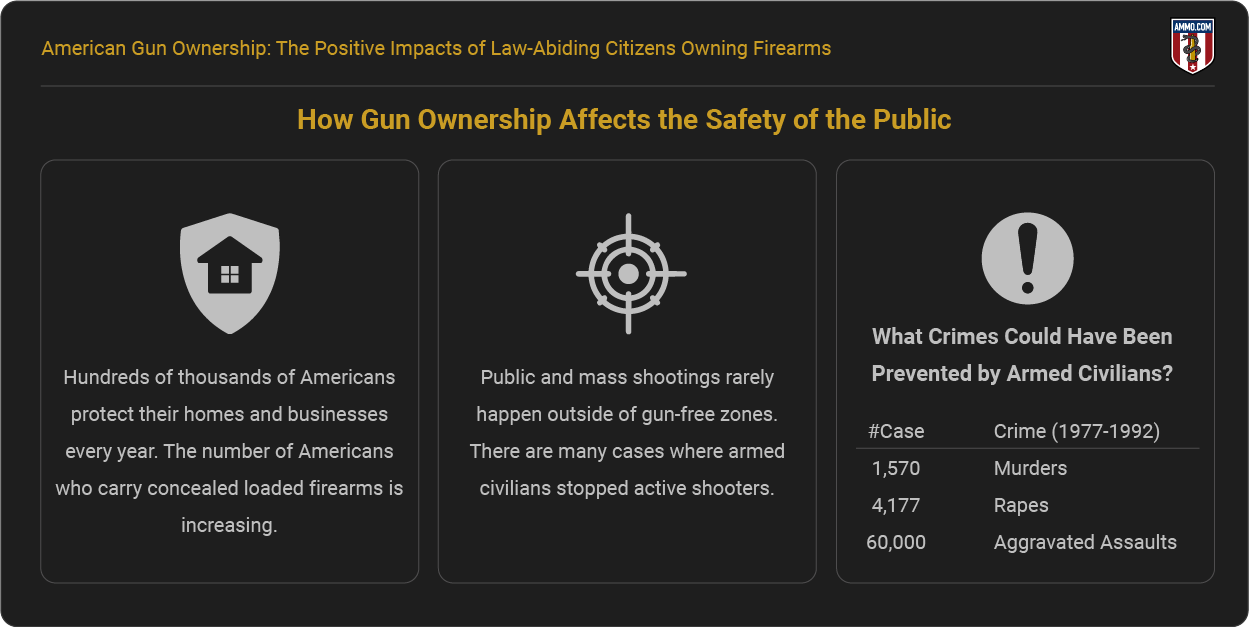
Home and Business Protection
We’ve all heard the phrase, “When seconds matter, our police are only minutes away.” Homes and businesses tend to be attractive targets for all sorts of criminals and deviants. Therefore, armed civilians, who protect their homes and businesses, often deter and stop crime when police aren’t available.
A 2001 study showed that 497,646 homeowners scared away potential intruders with a firearm. However, the Kellerman study showed that only three homeowners of 198 used a gun to stop a threat efficiently. 23
In 2015, approximately 9 million Americans had carried a loaded firearm within the past month when surveyed. In 2019, that number increased to 16 million. Furthermore, in 2019, approximately 6 million people carried a firearm daily. 21
Public Shootings
While many 2A opponents often cite the failures of “good guys with guns,” it is undeniable that armed civilians can effectively stop threats. For example, Elisjsha Dicken, a 22-year-old armed civilian, fired ten shots from his 9mm at 30 yards, neutralizing a mass shooter at an Indiana mall. 22
In a devastating 2023 school shooting, police revealed that the shooter chose an elementary school over another target because the secondary target had “too much security.” 26
Although the subject is hotly debated, an estimated 94% of mass shootings occur in gun-free zones. 24 Not only have armed civilians stopped active shooters, they’ve also deterred them.
The Exponential Impact of Owning Guns in America
America does have higher gun death and homicide rates than Canada, the U.K., and Australia. Of course, Canada, the U.K., and Australia have always had lower homicide rates than the U.S. Furthermore, the U.S. has much lower homicide rates than many other countries with fewer guns.
In fact, Mexico and El Salvador have fewer guns than any “safer” country, including the United States, and astronomically higher homicide rates. With relaxed borders, cultural diversity, heavily impoverished areas, and gang membership rates higher than any of the Western countries mentioned, the U.S. is relatively safe compared to countries with similar cultural attributes.
Finally, a cross-sectional study that examined crime from 1977 to 1992 concluded that an armed civilian could’ve prevented 1,570 murders, 4,177 rapes, and 60,000 aggravated assaults. 25
Whereas many Western countries enjoy low homicide rates despite gun ownership rates, many other countries with similar attributes to the U.S. do not. Therefore, it stands to reason that the United States is safer because armed civilians can defend themselves, and many would-be criminals know it.
Why Are Guns Legal in the U.S.?
The legalization of firearms in the U.S. has been a point of contention since the British ruled the colonies. Despite claims to the contrary, American civilians still have the right to keep and bear arms.
Let’s explore why that is by covering a few key points.
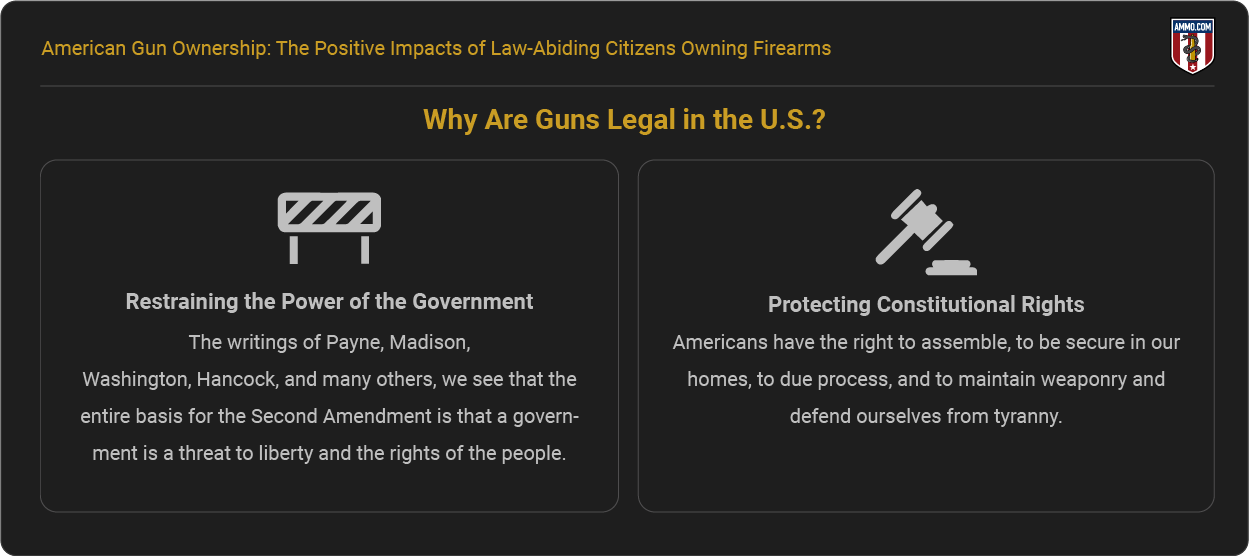
Restraining the Power of the Government
Contrary to anti-gun lobbyists' and advocates’ claims, the guys who fought the most powerful army in the world over their guns did not write the Second Amendment for hunting. It also isn’t simply about the right to own machine guns.
The Second Amendment is very clear: A well-regulated militia is necessary for the security of a free state. Therefore, the right of the people to keep and bear arms shall not be infringed.
When we explore the writings of Payne, Madison, Washington, Hancock, and many others, we see that the entire basis for the Second Amendment is that a government is a threat to liberty and the rights of the people. Fortunately, the founders were wise enough to secure our freedom with the right to keep and bear arms.
Protecting Constitutional Rights
Without the right to keep and bear arms, Americans would have no protection from a tyrannical government. Each amendment is designed to ensure the people have ample means to defend our liberties from the government.
We have the right to assemble, to be secure in our homes, to due process, and to maintain weaponry and defend ourselves from tyranny. While some have forgotten the sole principle of the Constitution, it’s important to note that the right to keep and bear arms is not only a right but a duty.
The Truth Behind Anti-Gun Rhetoric
Anti-gun rhetoric hasn’t changed much since the 1920’s. Essentially, the argument is that if it were more challenging for criminals to get firearms, there wouldn’t be as many crimes.
Trends throughout history disprove this seemingly logical claim, but the argument goes much deeper than stopping crime.
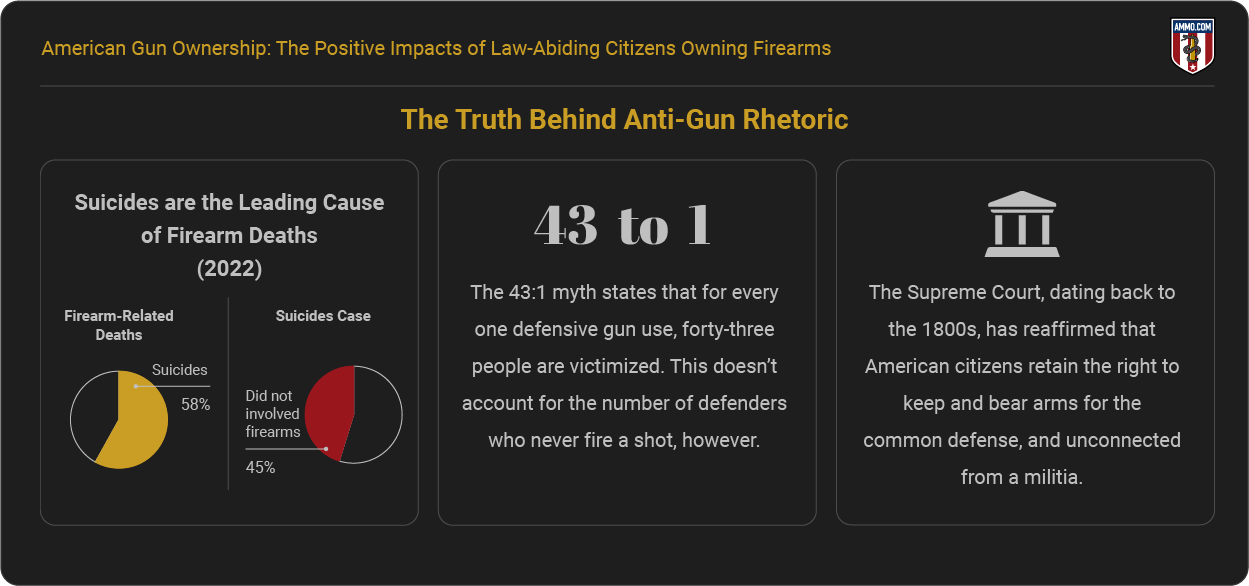
Suicide
The vast majority of firearm-related deaths in the U.S. are suicide. In 2022, 58% of all firearm-related deaths were suicides (27,032 of 46,683 total). Furthermore, nearly half of all suicides in 2022 involved something other than a firearm.
Unfortunately, suicides are the leading cause of firearm deaths and other injury-related deaths year after year.
43 to One
A 1987 study that included 743 firearm homicides from 1978 to 1983 showed that individuals for every 43 firearm-related homicides, there was only one defensive use case. 19 However, the study neglected to define the shooting type properly and did include defensive use cases where the defender never fired a shot.
When we combine all survey and study data, we see that there are an average of 1.8 million defensive gun use cases each year. This estimate ranges from 1,500 (Gun Violence Archive) to 3 million in a 2001 study.
Gun Rights
Contrary to popular belief, the right to keep and bear arms is not centrally focused on the firearms themselves but rather on the right of the people to keep and bear arms for the common defense.
Furthermore, many state constitutions reaffirm the right of the people to keep and bear arms for the defense of self. Supreme Court cases dating back to the late 1800s (Cruikshank and Presser) also reaffirm the 2A’s purpose as an individual right. Therefore, despite anti-gun activists’ claims, Second Amendment rights are an individual liberty separate from a militia.
Popular Ammo Calibers
Upon realizing the value of gun ownership in America, your firearm-ownership journey gets pretty interesting. Finding the caliber that best fits your lifestyle and needs varies. Let’s discuss the most popular ammo calibers in America.
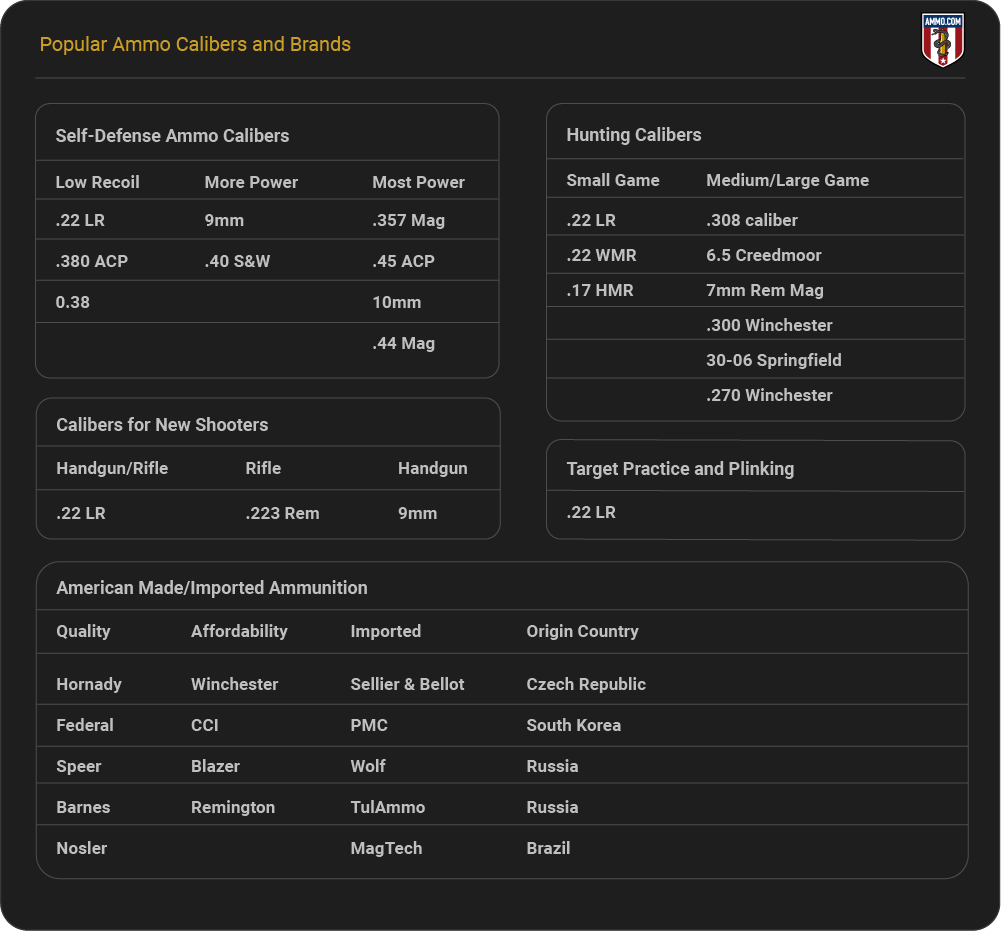
Self-Defense Ammo Calibers
Any piece of metal flying at hundreds of feet per second can stop threats. However, there are a few popular self-defense ammo calibers that deserve recognition.
Rifle calibers such as .223 Rem or 5.56 are optimal for self-defense, while handgun calibers such as the 9mm, 40 S&W, .380 ACP, .38, .45 ACP, .357, and the 10mm are all popular options.
Hunting Ammo Calibers
Choosing the most popular hunting calibers is tricky because we can’t use varmint rounds on elk. Furthermore, we must explore distance and terminal ballistics to assess which is better for the hunt.
However, choosing the most popular hunting calibers for the hunt doesn’t have to be complicated.
The smaller calibers are typically better for smaller game, while the medium and larger calibers are better for medium and large size game.
Target Practice and Plinking Ammo Calibers
Naturally, it’s recommended that you practice with your EDC and hunting rifles. However, there are calibers that reign supreme for novice shooters and those who simply enjoy shooting.
These calibers are typically more cost-efficient with lower recoil. No one likes leaving range day with an aching shoulder and empty wallet. So, if you’re interested in learning to shoot and are in the market for a caliber to have fun with, there are some great options.
Best Calibers for New Shooters
With millions of new gun owners each year, we’re seeing an uptick in novice shooters at the range. Furthermore, instructors are sharing their insights into the best calibers for new shooters.
Picking a caliber for new shooters can be a bit tricky. On one hand, you don’t want to scare them or make them uncomfortable. On the other hand, you don’t want to give them a false sense of security with a lower-powered round.
Beginning with a .22LR (handgun or rifle) is typically optimal to give new shooters some experience. However, upgrading to a more powerful round like the 9mm or .223 Rem is also a good idea because the new shooter can become better acquainted with more effective calibers.
Popular Ammo Brands
Now that you understand gun ownership in the U.S., let’s talk about the ammo. Ammo, similar to guns, is another part of American culture. Our ammo selection is vast, with many excellent options for every person’s needs.
American-Made Ammunition
There’s no shortage of ammunition manufacturers in the U.S. Some of the most popular ammunition is American-made.
Hornady is known for its phenomenal designs and reliability, while Federal produces mixed categories of high-quality and affordability. Nosler produces excellent hunting ammunition, while Blazer and CCI are known for their target rounds. Winchester and Remington are popular for their range and hunting ammunition.
Imported Ammunition
Imported ammunition shouldn’t be overlooked, either. American shooters have enjoyed low-cost cartridges from other countries for many decades.
Unfortunately, the selection of imported ammunition isn’t as plentiful as it once was due to sanctions placed on Russia. However, TulAmmo and Wolf are still available at times. PMC is a South Korean ammunition company specializing in FMJ (target practice) ammo, and it also produces some JHP (defense ammo) cartridges.
Sellier and Bellot come from the Czech Republic and produce high-quality FMJs (target ammo). Finally, MagTech is a Brazilian company that produces range ammo.
American Gun Ownership: The Power of the People
American gun ownership isn’t an exceptional obsession with firearms; It’s an exceptional enthusiasm for the right of free people to protect their families, homes, businesses, and country.
Although many foreigners (and even some Americans) don’t understand our gun culture, we do have valid reasons for maintaining our place in the world as the country with the highest rates of civilian-owned guns. Whether we’re speaking in terms of our liberty or our personal safety, the right to keep and bear arms belongs to the individual. It isn’t a right given to us by our government; it is a right we continue to afford to ourselves.
Sources
- Gun Ownership Provides Effective Self-Defense
- Government Continues to Downplay, Distort Data on Defensive Use
- CDC Wonder Underlying Cause of Death 1999-2020
- CDC Wonder Underlying Cause of Death 2018-2022
- Gun Violence Archive: Defensive Use Cases
- Number of People Shot to Death by Police 2017-2024
- Stricter Gun Laws Less Popular in the U.S.
- Stark Gender Gap in Gun Ownership, Views of Gun Laws in the U.S.
- Key Facts About Americans and Guns
- Key Takeaways on Americans’ Views of Guns and Gun Ownership
- “Two Battlefields” Opps, Cops, and NYC Youth Gun Culture
- Sexual Dysfunction and Gun Ownership in America: A Limp Theory
- Size Matters: Penis Dissatisfaction and Gun Ownership
- Castle Rock vs. Gonzalez
- 8 Facts About Americans with Disabilities
- FBI: Uniform Crime Database (2022)
- How Owning a Gun Raises Anxiety
- NICS Monthly Firearm Background Checks
- Protection or Peril? An Analysis of Firearm-Related Deaths in the Home
- 12 Defensive Gun Use Statistics Show That Armed Citizens Make Communities Safer
- Trends in Loaded Handgun Carry Among Adult Handgun Owners in the United States (2015-2019)
- ‘True American Hero’ Stopped Greenwood Park Mall Shooting Within Seconds
- Lawyers, Guns, and Burglars
- Mass Public Shootings in Gun Free Zones
- Crime, Deterrence, and Right-to-Carry Concealed Handguns
- Covenant School Shooter Audrey Hale Eyed a Second Target
Infographics
- Are Guns & Ammo The New Gold? Why More Americans Are Arming Themselves
- The Greatest Gun Salesman In America: President Barack Obama
- Shooting Straight: How Both Presidential Candidates Have Changed On Gun Control
- President Obama: (Still) The Greatest Gun Salesman in America
- An Inconvenient Truth: How The Obama Administration Became Earth's Largest Arms Dealer
- Armed Drones: President Obama's Weapon of Choice
- COVID-19 Data Study: Ammunition Sales Continue to Soar in Response to Coronavirus Panic
- Data Study: 18 Months of Ammo Sales during a Pandemic, Protests, and the Biden Presidency
- Data Study: U.S. Ammo Sales Surge Following Russian Invasion of Ukraine
- Most Gun-Friendly States in 2024
- Worst States to be a Gun Owner (2024 Updated)
- Children & Firearms: Definitions and Demographics Make All the Difference
- Urban Violent Crime & Legal Gun Ownership
- Gun-Free School Zone Laws & School Shootings (2024 Updated)
- Gun Control Laws and Enforcement Trends 2024
- Gun Ownership by State (2024 Statistics)
- How Many Gun Owners are in America? (2024 Statistics)
- Concealed Carry Crime Stats 2024
- Accidental Shooting Statistics: A Review of Unintentional Firearm Deaths from 1979-2024
- America’s Stolen Guns: A Silent Contributor to Gun Crimes in the U.S. (2024)
- Gun Violence Statistics 2024: Comprehensive Look at the Data
- Gun Laws vs. Crime Rates in 2024: A Comprehensive Analysis
- Gun Death Statistics by Caliber: A Review of Calibers and Crime in 2024
- Anti-Gun Control Arguments 2024: Facts Gun Control Lobby Suppress
- Guns in the Home Statistics: The Effects of Firearms in the Home in 2024
- Gun Deaths in the US: Analyzing At-Risk Demographics in 2024
- How Many Guns in the U.S.: All About America’s Firearms in 2024
- Gun Facts in the U.S. 2024: The Reality of Firearms in America
- Defensive Gun Use Statistics: America’s Life-Saving Gun Incidents (2024)
- Correlation Between Mass Shootings and Prescription Drugs (2024 Study)
- Gun Ownership by Gender in 2024: Closing the Gender Gap
- Murders by Weapon Type: September 2024 Statistics
- Gun Violence Among Black Americans: September 2024 Statistics
- The Ultimate Hunting Caliber Chart: Best Cartridge Per Species
- How Old Do You Have to be to Buy a Gun: A State Guide 2024
- Most Popular Guns in the U.S.: The Must-Have Guns in 2024
- Stray Bullet Deaths: Accident and Injury Statistics in September 2024
- Mass Shooters by Race: Demographics of Assailants 1966-2024
- Ammunition Limits By State in 2024: How Much Ammo Can You Buy?
- Why Do Americans Own Guns in 2024?
- How Many Americans Want Stricter Gun Laws in 2024?
- How Many Households in the U.S. Have a Gun in 2024?
- What Percentage of Gun Deaths are Suicides in 2024?
- Average Age of Mass Shooters in the U.S.
- Firearm Ownership in America by Year
- US Firearms Deaths Per Year: A Collective Report 1968-2024
- Percentage of Americans Owning Guns in 2024
- Texas Gun Ownership: Total Numbers, Trends, and Most Popular Guns
- Gun Ownership Statistics Colorado 2025: Trends & Numbers
- Hunting Accident Statistics 2025 (Causes & Trends Per Year)
- Banned Guns & Ammo List: A 2025 Review by State
- 3D Printed Gun Laws By State
- How To Build a Home Shooting Range: The Ultimate Guide
- States With the Highest Murder Rates
- Best Self-Defense Weapons for Women
